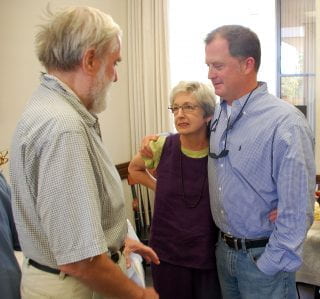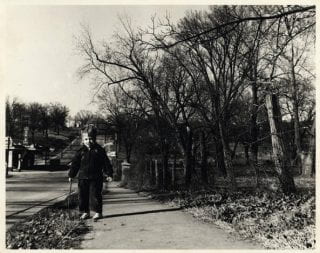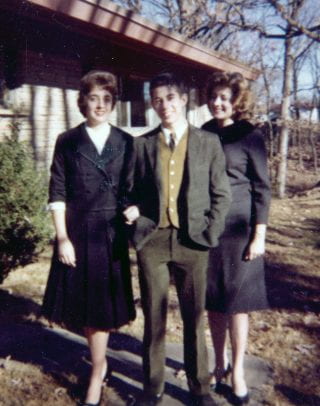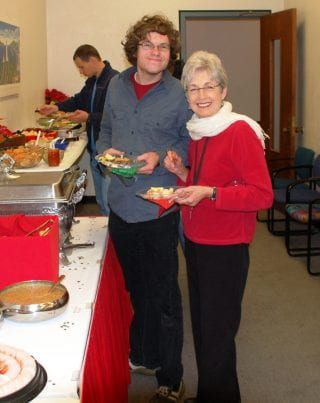Catherine Wallack, Architectural Records Archivist for Special Collections, contributed to this remembrance.
The University of Arkansas Libraries and Special Collections grieve the passing of Ellen Compton, a longtime staff member and a guiding force in our archivist family, on March 19, 2020. Compton left an indelible mark on the development of Special Collections, being involved in the acquisition and processing of scores of collections, from very small donations to the division’s largest and most significant holdings. Compton was an early member of the processing team for the Senator J. Williams Fulbright Papers and later led the processing of the papers of celebrated architect Fay Jones. She was also a tireless advocate of local history studies and community service. She will be forever missed.

“Ellen was one of the first people I met when I moved to Fayetteville in 2017 and began working in Special Collections,” remembers associate dean of Special Collections Lori Birrell. “She unfailingly took the time to introduce me to potential collection donors and supporters of archival work whenever we spent time together. I’m forever grateful for the connections Ellen helped me forge as a newcomer to Arkansas.”
Born August 22, 1938, in Little Rock, Arkansas, Compton spent much of her childhood in Bentonville. She received a bachelor’s degree in history in 1960, followed by a Master’s in 1966 from the University of Arkansas before joining the Libraries in late 1970s. Her sister Edra recalled with pride that, among Ellen’s many memberships in student organizations in high school and college, she was president of the Association of Women Students at the University. Contributing to Special Collections over more than 30 years through many important roles, Compton was the last member of the Libraries with the title of Field Archivist, responsible for finding and soliciting materials from around the state of Arkansas. She also served as Major Gifts Development Officer for the Libraries during a period of expansion. Compton formally retired from Special Collections in 2010, although she continued to serve the department through reference work for the architectural archives, outreach initiatives, and records management for several more years.

“Working with Ellen was a highlight of my career,” said Tim Nutt, director of the UAMS Historical Research Center and former head of Special Collections. “Not only was she smart and seemed to know everyone, but she was also the kindest, most generous, funniest person I’ve ever met. Ellen was never a loner, she was always part of a team, and I will forever feel blessed to have been on hers.”
In addition to her pivotal role in acquiring collections, Compton led by example as someone dedicated to preserving history and culture, ensuring the remarkable records of her own family were also saved and available to students and professional researchers. From the archives of her famous father Neil Compton’s work as an environmentalist and physician, to the legacy of leading women citizens of Benton and Washington County, the materials associated with Compton’s family are essential to almost any study of the history of Northwest Arkansas. Her grandmother, Edna Putnam, was a pioneering businesswoman in Bentonville. Compton’s family home in Bentonville is now home to the Compton Gardens and Conference Center next door to the renowned Crystal Bridges Museum of American Art.

A close friend of politicians, artists, scholars, business people and entrepreneurs (including generations of the Walton family)—Compton served as a vital link between the University, its library, and the people of the state the University serves. On the wall in Special Collections is an original piece of artwork given to Compton by the art historian and celebrated author, Donald Harington. Compton in turn, of course, donated it to the Library. Books, artwork, memorabilia, as well as the archives she worked on, all remain as tangible contributions to her alma mater and professional home. Recently Ellen was heard to remark in casual conversation that she had met every living Governor of Arkansas in her lifetime. She was a friend and colleague of political scientist and Clinton adviser Diane Blair during the dynamic period of influence and growing women-led research at the University. Compton was widely known to be as well networked as one could be in the state, seemingly just one or two degrees away from nearly everyone in Arkansas.
Compton was responsible for the handling of some of the University Library’s most marquee holdings. Perhaps more emblematic of her importance as an archivist and steward of history were Compton’s efforts to document unknown individuals and families and local organizations that are also integral parts of the state’s complex story. She helped Special Collections build a remarkable group of Home Demonstration Club and other women’s organization archives, and she was instrumental in the Libraries bringing in obscure treasures that could have been lost if not for her diligence. One example is the “Peg Leg” Decker archive of turn of the 20th century photographs of Searcy County, Arkansas. The fragile glass plate negatives capture the once thriving boom town of Leslie, Arkansas, and neighboring town of Marshal as the timber and fruit industries brought tremendous, and tragically brief, prosperity and growth, a history almost entirely lost to time. Thirty years later the people of Searcy County are still grateful for Ms. Compton taking the time to collect their stories, as colleagues of hers have learned upon visits with historians and organizations.
Compton was also an active history scholar. She published in the Arkansas Historical Quarterly, the Arkansas Librarian, and in local history and university publications, and was a frequent and beloved presenter at meetings of all types. Her generosity in promoting the work of younger colleagues is just as remarkable. Almost without fail one could expect to see Compton in the audience ready to hear whatever an archivist, historian, or librarian was sharing at local presentations and exhibitions. As her friend and collaborator, Charlie Alison recalled, “She was a great person to draw other people into good projects — students, colleagues and amateurs like me — and we’ll be the lesser for her passing.”

The Arkansas Historical Association honored Compton with its Lifetime Achievement Award in 2018. A lifetime member, Compton also served on its Board of Trustees from 1982 to 1985 and was elected president, serving from 1986 to 1988. As the association’s secretary, professor Patrick Williams noted, even though Compton was not the society’s first female president, she established new gender parity and respect that will never recede, and was the first female president to be known by her own name, not her husband’s. Gifted with boundless energy for service, Compton was also a member of the Arkansas Natural Heritage Commission from 1979 to 1996, appointed twice to that position by then Governor Bill Clinton.
Compton was passionate and dedicated to collecting and sharing local history. As a long-serving member of the Washington County Historical Society, Compton edited its journal The Flashback and helped organize and supported countless events about local history and genealogy. The society named her a Distinguished Citizen in 2017.
In 2013 Compton published, with Alison, a photographic history of Fayetteville. Alison recalls how right up until the final deadline, Compton continued to refine her selection of more than 200 images, suggesting new context and descriptions, drawing from an inexhaustible and intimate knowledge of not only local history, but of every collection of photographs available. With a “keen eye for detail” she “made selections that offered readers details that a similar photo from the same era wouldn’t.”
Special Collections and the whole University Libraries share in the grief of Ellen Compton’s family. We ask that you join us in the celebrating her remarkable life and career.

The photo of Gordon Morgan needs some attention. Probably changed when resized for this use.